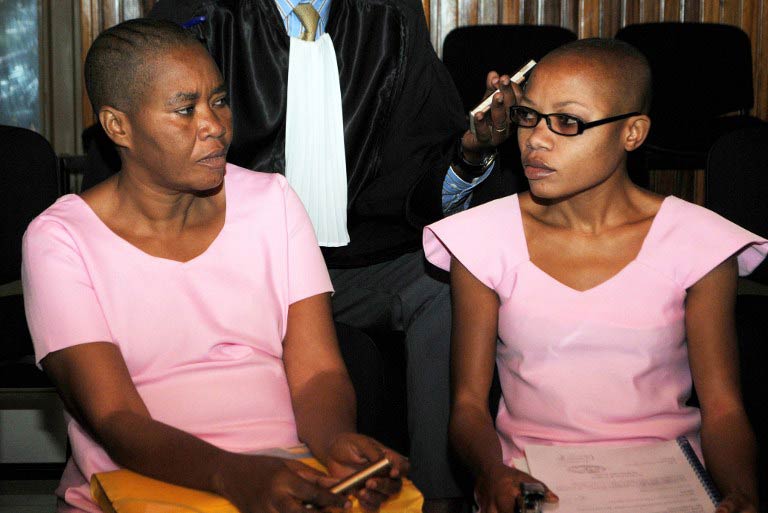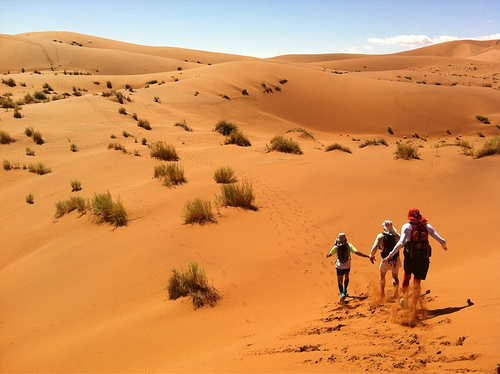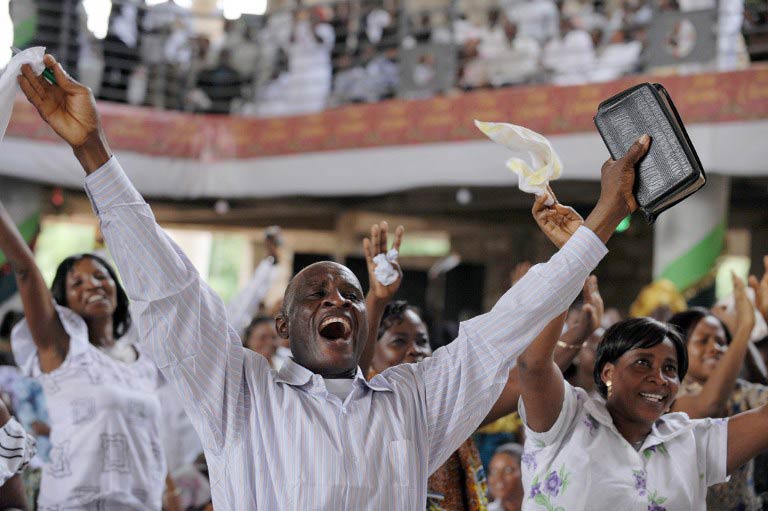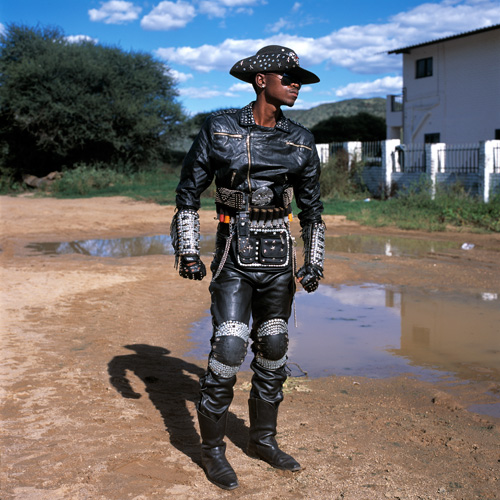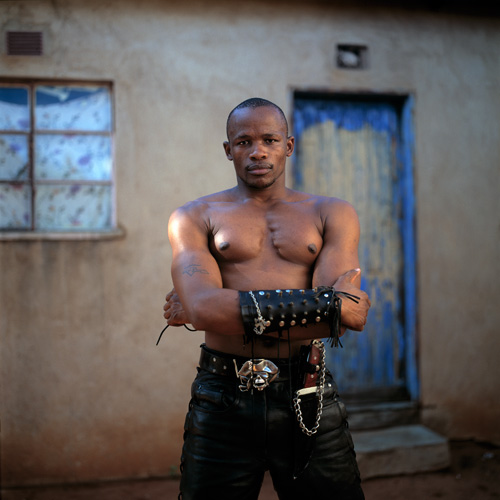At first glance, Republic, a revolution-themed bar in one of Accra’s busiest nightlife districts, could be any of the Ghanaian capital’s hotspots. Artsy residents, office workers and expats sit on plastic chairs in front of its wooden façade as dusk turns to night, ordering caipirihnas or snacks such as thick-cut chips and bowls of soup.
But look a little closer and all is not as it seems. The caipirihnas are made from akpeteshie – a traditional Ghanaian palm spirit also known fondly as Kill Me Quick, the chips are deep fried cassava, and the soup is called Fire Go Burn You – a particularly spicy incarnation of Ghanaian pepper soup.
Republic has an ethos of using local ingredients, championing traditional Ghanaian brews and ingredients but serving them up with a twist, and its owners say they are part of a foodie revolution beginning in the region, marking a new dawn in attitudes to eating.
“We are trying to create a new atmosphere here, and to rejuvenate our sense of identity,” said Kofi Owusu-Ansah (39) who founded Republic with his brother Raja last year. “If you look at our spirits, you will find not one single import – the base for all our cocktails is local-made sugar cane spirit akpeteshie”.

“We want to empower local industry and local brands,” Owusu-Ansah added. “It’s kind of a revolution the way I see it. No one in Ghana has ever experimented with these kind of cocktails using our Ghanaian spirits, even though all the ingredients are here. But now people are beginning to turn away from depending on whatever comes from the west, and making our own thing.”
There are no shortage of delicious ingredients to use. With fresh fish from the Atlantic, abundant and varied crops and a long heritage of spicy, well-seasoned food, some believe West African countries such as Ghana have the potential to be destinations for foodies from around the globe. But years of negative publicity and a failure to make local delicacies accessible to the outside world have skewed perceptions of the region.
“Nobody associates Africa as a continent with good food,” said Tuleka Prah, whose Berlin-based project My African Food Map documents food highlights from across the continent.
“People associate Africa first of all as a continent without food. If they do realise there is food there, they never think of it as good food – but as food that doesn’t taste nice, is difficult to make, stands around for hours, and is rudimentary and functional food,” Prah added.
“In Berlin, where I live, for example, there are lots of posters saying ‘Bread for Africa,’ accompanied by a photo of a hungry child and a piece of bread. The idea is that all Africans need is food to fill them up.”
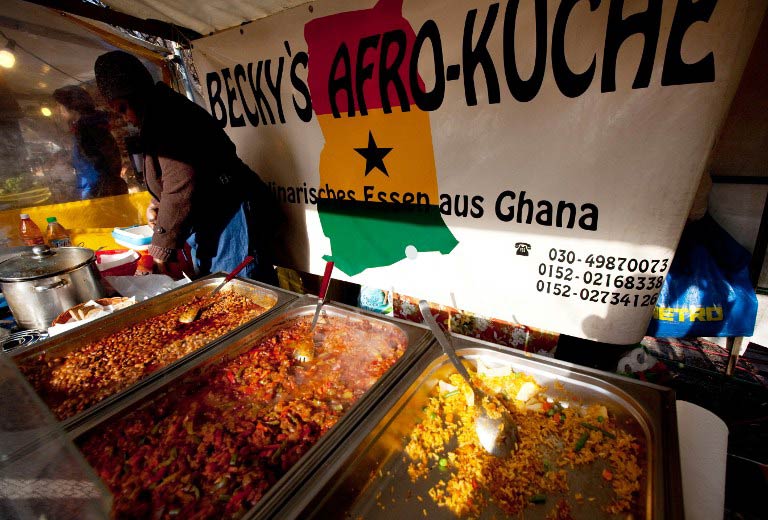
Frustration at the way African food has been presented to the outside world has prompted a new debate.
“I’m a foodie and a wine writer, and I wanted to create a space where we can talk about anything and everything to do with African food and wine,” said Bukola Afolayan from the influential Africa Is a Country blog, whose new series Africa is a Kitchen looks at cooking across the continent. “It’s not just about taste and design, but also about chemistry, politics and economics.”
“I’ve noticed a change in attitudes recently. For example the big boys Accra and Lagos have always drunk champagne to show off, not because of an appreciation for it. But now I have noticed wine clubs opening up in Nigeria. And whereas it used to be bad wine that was imported to West Africa, there is more of a discernment now, with better wines from South Africa, Portugal and Spain.”
In western Ghana, upmarket beach resort Lou Moon is set on a tranquil bay sheltered from the rough waves of the Atlantic. But it’s the hotel’s food that is the big draw, with chef Yvonnic Ganlonon, who trained in gastronomic French cooking in Benin, using vegetables grown in the resort’s own garden and fish caught daily by local fishermen to offer exquisite food at London prices.
“I think people who come here appreciate the care and passion we take over our food. I love using the natural ingredients we grow here – cabbage, squash, carrots – everything is from our own garden,” said Ganlonon. “I come from a family of chefs, going back to my grandfather who is a master and teacher. My signature dishes are avocado and salmon velote, squash gratin, and a dessert of mango coulis and chantilly cream.”
But although Ghanaians have been going to places like Republic and Lou Moon in search of good food, diners around the world have been eating West African-inspired dishes without realising it.
“A lot of my inspiration comes from my mum, and the Ghanaian food my mother cooked for us growing up,” said Francis Ageypong, head chef at Christopher’s restaurant in Covent Garden, London. “I like food with flavour and I think that shows in my cooking.”
“I’ve noticed a lot of Africans entering the catering industry now – they are starting to see it as a career, instead of a go-between job, and realising how happy you can make people with really good food.”
How to make kelewele (spicy fried plantain)
Ingredients
4-6 ripe plantains cut into bite-sized cubes
1-2 teaspoons Cayenne pepper
½ teaspoon peeled grated fresh ginger root
1 teaspoon salt
2 tablespoons warm water
Vegetable oil to fry
Chopped peanuts to garnish (optional)
Directions
1 Grind together grated ginger root, pepper, and salt and mix them in the water. Leave to stand for 10 minutes.
2 Place the plantain cubes into a bowl and toss together with the water and spice mixture
3 Heat about 2cm of oil in a deep pan of oil until it is hot
4 Add plantains, ensuring they are not touching or they will stick together – fry in several batches if necessary.
5 Cook until golden brown, turning once, then drain on absorbent paper. Sprinkle with chopped peanuts if desired.
6 Leave to cool for 3 minutes, then serve hot!
Afua Hirsch for the Guardian Africa Network.
